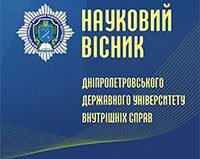Nataliia KOMYKH
KOMYKH N. (2022), CONCEPTUAL BASIS OF THE PRESENTATION OF THE CANON OF WOMEN’S CORPOREALITY: THE CONTEXT OF WAR; Scientific Bulletin of Dnipropetrovsk State University of Internal Affair, Special Issue №2, 158-163
DOI: 10.31733/2078-3566-2022-6-158-163
ABSTRACT. The article examines the conceptual foundations of the study of female physicality, which is presented in the virtual space in the conditions of the Russian-Ukrainian war. It is noted that war takes place in two spaces: objective and virtual. The latter has significant advantages in view of the possibilities of visualization and reproduction of events in real time. The reality of war shapes a visual narrative that undermines issues of gender equality and temporality. The canon of female corporeality is examined from the standpoint of the concept of “discursive power” by M. Foucault. The main theoretical positions in the work are the scientist’s ideas about the body and sexuality, discursive power and biopower, as its modern form. The first is a disciplined organism, an “obedient organism”, the functioning of which is no longer determined by external rules of authoritative regulation and subordination, but by more intensive norms of self-regulation, self-management and self-control. The second is a body imbued with the mechanics of the “living”. The phenomenon of the body and bodily practices of subjectivity is analyzed by M. Foucault on the example of different levels of functioning of reality – not only penitentiary practices of supervision and punishment, but also on the example of the analysis of language, text, medical practices, and practices of sexuality.
Heuristically significant are the ideas of A. Frank, who adds to the proposed signs of the canon of corporeality an explanation of an institutional and communicative nature, which makes it possible to record the symbolic content of the narrative of corporeality in virtual space in the conditions of hybrid war and militarization. It has been noted that the canon of female physicality appears as a discursive practice that fixes the cultural situation with a standard set of cultural meanings. The viewer consumes visual content and is included in the situation of bodily “living” the text.
Keywords: corporeality, virtual reality, visual turn, discursive power, hybrid warfare, militarism, canons of the human body.
- References:
- Burdʹye P. (2003) Praktychnyy hluzd [Practical sense] ; per. z fr. O. Yosypenko, S. Yosypenka, A. Dondyuka ; za red. S. Yosypenka. Kyiv : Ukrayinsʹkyy Tsentr dukhovnoyi kulʹtury, 528 p. [in Ukr.].
- Verbytsʹka, O. V. (2012) Postmodernizm yak dyskursyvna paradyhma rozuminnya telesnosti. Filosofiya i politolohiya v konteksti suchasnoyi kulʹtury. Issue 4, pp. 117-122. [in Ukr.].
- Kultayeva, M. D., Navrotsʹkyy, O. I., Sheremet, I. I. (2013) Yevropeysʹka teoretychna sotsiolohiya XX – XXI stolittya European theoretical sociology of the 20th – 21st centuries: navch. posibnyk. Kharkiv : Kharkivsʹkyy nats. un-t im. V. N. Karazina, 372 p. [in Ukr.].
- Obraz, tilo, poryadok. Henderni doslidzhennya v mizhdistsyplinarnomu spektri: antolohiya [Image, body, order. Gender studies in the interdisciplinary spectrum: anthology] / za red. K. Mishchenko, S. Shtretlinh. Kyiv : Meduza, 2014. 232 p. [in Ukr.].
- Fuko, M. (1997) Istoriya seksualʹnosti [History of sexuality] ; per. z fr. Kharkiv : OKO, 235 p. [in Ukr.].
- Frank A. For a sociology of the body: an analytical review. The body: Social process and cultural theory edited by M. Featherstone, M. Hepforth and B. Turner. London: Sage Publications Ltd., 1991. P. 36-102. URL : https://sk.sagepub.com/books/the-body. [in Ukr.].
- Scarry E. The Body in Pain: The Making and Unmaking of the World. Oxford University Press, 1985. 385 r. URL : http://surl.li/eihdr. [in Ukr.].
